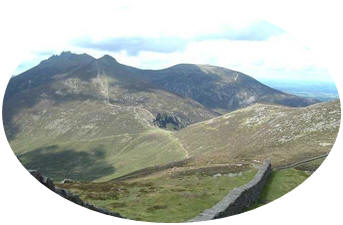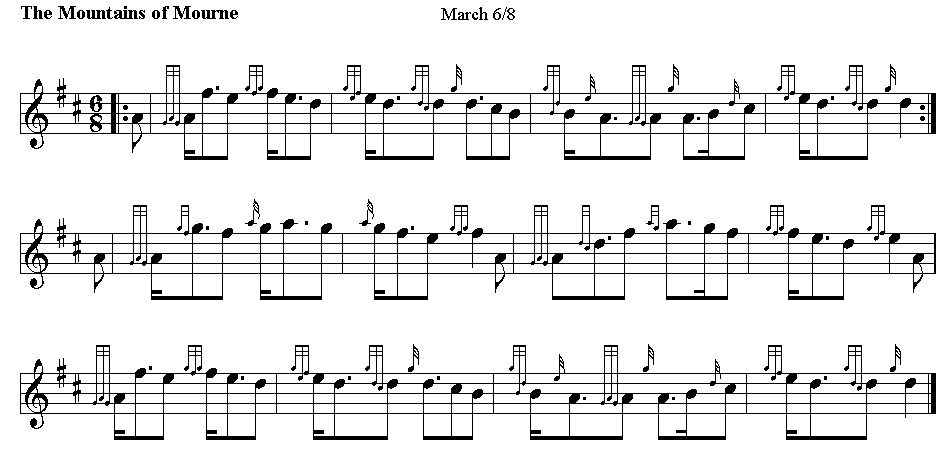 |
||||

Best viewed in
|
The Mourne Mountains or Mournes (Irish: Na Beanna Boirche), a granite mountain range located in County Down in the south-east of Northern Ireland, are among the most famous of the mountains in the country. The surrounding area is an area of outstanding natural beauty and is proposed as the first national park in Northern Ireland. The Mountains of Mourne are partly owned by the National Trust and see a large number of visitors every year. The Mourne Wall is among the more famous features in the Mournes. It is a 22 mile dry-stone wall that crosses fifteen summits, constructed to define the boundaries of the 8,900 acres area of land purchased by the Belfast Water Commissioners in the late 1800s. This followed a number of Acts of Parliament allowing the sale, and the establishment of a water supply from the Mournes to the growing industrial city of Belfast. Construction of the Mourne Wall was started in 1904 and was completed in 1922. The lyrics to the song The Mountains of Mourne were written in 1896 by the 19th Century Irish musician Percy French. It is normally sung to the same tune used by Thomas Moore (1779–1852) for his song "Bendemeer's Stream". The song is representative of French's many works concerning the Irish diaspora. (William) Percy French (1 May 1854 – 24 January 1920) was one of Ireland's foremost songwriters and entertainers in his day. French was born at Cloonyquin House, near Elphin, County Roscommon, the son of a Protestant landlord. He was educated at Foyle College, Derry, and wrote his first successful song while studying at Trinity College Dublin (TCD) in 1877 for a "smoking concert". The song Abdul Abulbul Amir was sold for £5 to an unscrupulous publisher. The song later became hugely popular and was falsely claimed by other authors. He graduated from TCD as a civil engineer in 1881 and joined the Board of Works in County Cavan as an Inspector of Drains. It is said that he wrote his best songs during this period. He also painted: he was a prolific painter of landscape watercolors and during this period considered art to be his true vocation. In fact, when he became well-known later in his life, his paintings from his time as a civil engineer became fashionable and sought after. When the Board reduced its staff around 1887, French turned to journalism as the editor of The Jarvey, a weekly comic paper. When the paper failed, French's long and successful career as a songwriter and entertainer began. He became renowned for composing and singing comic songs and gained considerable distinction with such songs as Phil the Fluther's Ball, Slattery's Mounted Foot, and The Mountains of Mourne. (This last was one of several written with his friend, stage partner and fellow composer, Dr W. Houston Collisson.) But perhaps one of French's most famous songs is Are Ye Right There Michael, a song ridiculing the state of the rail system in rural County Clare. The song caused such embarrassment to the rail company that it led to a libel action against French, though this ultimately failed. (It is said that French arrived late for the libel hearing at the court, and when questioned by the judge on his lateness, he responded "Your honor, I travelled by the West Clare Railway," resulting in the case being thrown out.) French took ill while performing in Glasgow and died some days later (from pneumonia) in Formby at the home of his cousin Canon Richardson of Green Lea, College Avenue on 24 January 1920, aged 65. His grave is to be found in the churchyard of St. Luke's Parish Church, Formby in Merseyside. A statue of him sits on a park bench in the town center of Ballyjamesduff
Lyrics by Percy French
|
|||

